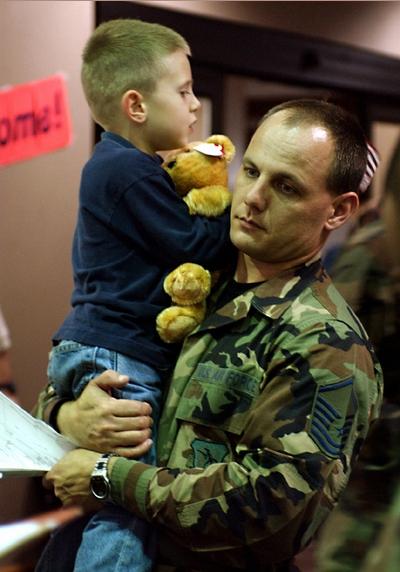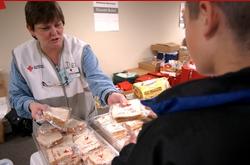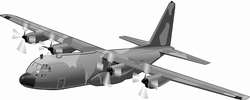Bringing Home Dependents, Non-Essentials
The first of several flights contracted to bring more than 1,300
Air Force family members and nonmission-essential civilian
employees from Incirlik Air Base, Turkey, arrived at Charleston
International Airport (SC) on March 21.
The voluntary return of people is in response to increased
security concerns, and allows family members and civilian employees
the option of leaving Turkey.

Making The Transition Liveable
Passengers stepped off the plane to find everything they needed
to help them make a comfortable transition from Charleston to their
chosen U.S. "safe havens." People from across Charleston AFB
greeted individuals with financial help, plane tickets, hotel
reservations and warm cups of coffee.
"We're here to provide comfort services to help families come
back to America at a stressful time," said Ben Myers, director of
disaster services for the Lowcountry Chapter of the American Red
Cross. The chapter donated more than 500 teddy bears for children
coming off the planes.
"It was a long trip back," said 5-year-old Alex, who was all
smiles as he clutched a teddy bear. "I just can't wait to have
spicy meatballs and go fishing."
But the safety and care of children were not the only things on
the minds of volunteers. Veterinarians were standing by to provide
services needed to keep the animals accompanying the families
healthy, safe and happy.
What About Rover?
 "For a lot of people, bringing their animals is
just as important as bringing their kids," said Army Capt. April
Ulmer, 437th Services Squadron veterinarian. "And animals can have
a lot of the same health problems humans have, but we're ready with
first-aid kits. We're also here to feed, walk and groom them before
matching them back up with their owners."
"For a lot of people, bringing their animals is
just as important as bringing their kids," said Army Capt. April
Ulmer, 437th Services Squadron veterinarian. "And animals can have
a lot of the same health problems humans have, but we're ready with
first-aid kits. We're also here to feed, walk and groom them before
matching them back up with their owners."
Family members receive full travel per diem for the first 30
days here, according to Air Force Personnel Center officials. From
days 31 to 180, they will receive 60 percent of the per diem. Also
included in their initial entitlements is a maximum $10 per-day
local travel allowance.
"The safe haven entitlement (enables) these family members to
live comfortably while they are separated from their (home,
schools, friends, neighbors and community)," said Peggy Rayfield,
from the AFPC's family matters operations section.
When families leave the Charleston area, they are not alone.
"No matter where the family goes in the US, Air Force family
support centers will be keeping an eye on them," said Fora
Hoss-Mason, 437th Mission Support Squadron Family Support Center
director. "Once families leave Charleston and arrive at their
safe-haven location, the closest FSC contacts them to offer
assistance and connect them to Air Force community."
Safety Precaution
 Although Department of Defense officials said
there is no specific threat to American military forces in Turkey,
there is a general threat of danger to the Americans in southeast
Turkey. Officials emphasized the cautious thing to do to keep
families as safe as possible is to take them to a safe haven in the
United States.
Although Department of Defense officials said
there is no specific threat to American military forces in Turkey,
there is a general threat of danger to the Americans in southeast
Turkey. Officials emphasized the cautious thing to do to keep
families as safe as possible is to take them to a safe haven in the
United States.
"There are a lot of people with mixed emotions," said Chaplain
(Capt.) Chuck Knauer, 437th Aerial Port Squadron chaplain. "They're
tired and anxious, but we're here to meet their total needs. If we
get them safely back home, then we've done our job."
Despite a long 18-hour flight, many people were in good
spirits.
"It went very smoothly," said Michelle, a returning family
member, pregnant with her first child. "It was a hard decision. I
left the most important thing (her husband) behind."
Michelle added that she never felt threatened in Turkey and
would "definitely go back." But most importantly, she, and many
others, just wanted their family members and the armed forces
overseas to "make (the war) quick so you can all come home."
 NTSB Final Report: Rutan Long-EZ
NTSB Final Report: Rutan Long-EZ ANN FAQ: Turn On Post Notifications
ANN FAQ: Turn On Post Notifications Classic Aero-TV: ICAS Perspectives - Advice for New Air Show Performers
Classic Aero-TV: ICAS Perspectives - Advice for New Air Show Performers ANN's Daily Aero-Linx (06.28.25)
ANN's Daily Aero-Linx (06.28.25) Aero-News: Quote of the Day (06.28.25)
Aero-News: Quote of the Day (06.28.25)





